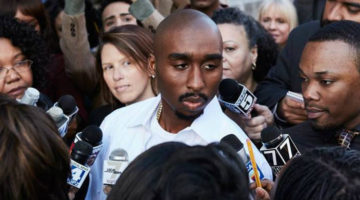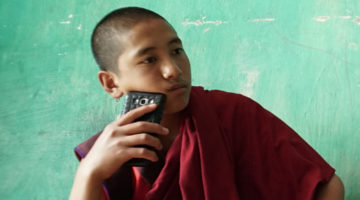Review: Aloha
There are exactly two and a half standout moments in the Cameron Crowe film Aloha, which is being released this weekend, but clearly meant for the holidays, judging by the abundance of Christmas trees and decorations.
The first standout moment occurs early on, and plays out almost exactly as we had hoped. Emma Stone’s Captain Allison Ng has been outed as a standout hoofer by Bill Murray’s character, Carson Welsh and they proceed to dance along the floor in a series of moves that are a lot of fun, (and to Hall & Oates, no less).
The second standout moment is when Alec Baldwin’s General Dixon berates Bradley Cooper, playing a character named Brian Gilcrest, reams him out in an increasingly funny series of personal attacks and shouting rampage.
The third standout scene is a quick aside, and happens towards the end of the movie. It involves Gilcrest and another actor who is strangely miscast. To reveal anything about this brief standout scene is to perhaps give away too much, but does not redeem the rest of the strange and potentially moving film.
Because the first scene involving Murray recalls an even better one from Sofia Coppola’s Lost in Translation, the Alec Baldwin rant does not quite equal his standout performance in Glengarry Glen Ross, and the scene at the end does not justify the movie as a whole, which essentially telegraphs its intention from its first scene, but does not sway from the course in such a way that it makes the film even the least bit believable.
It is watchable, especially in its above standouts, but there is far too much nonsense that just does not seem to belong in a film with this kind of pedigree. When Cooper shines, he really commands a film, but his performance here is too close to his recent misstep in Serena, rather than his natural charm.
Stone is even more perplexing, as she is quite frankly, annoying as Captain Ng early on, (and not in the good way, as in she is loveable as well). When Crowe loosens the reins a little bit and finally lets the character breathe, Stone is able to show more of her natural talent and ability, but this does not disguise the fact that her character’s name is Captain Ng! It’s pretty infuriating, actually.
In fact, the entire movie seems to be Crowe telegraphing his intentions, (e.g. it’s not enough for a supporting character to be hostile and belligerent, but he has to wear a t-shirt proclaiming this fact). Perhaps even more egregiously, a crucial plot development is suggested early on, in a way that comes about rather organically, but is then made explicitly clear, to the point where the audience members may have welcomed a little bit of ambiguity and mystery, instead of Aloha coming back and pounding us over the head with it, (the character of Gilcrest suffers from the complex as well, as there are far too many allusions to him being at the end of his rope, or not having any more chances, or any other sort of technique used to show how important this chance must be).
And we haven’t even gotten to the outrageous excuse for a character given to Rachel McAdams, who tries valiantly for the thankless role of the ex-wife of Gilcrest, along with her moppet children, but a reunion of Wedding Crashers just does not carry the weight that it should. In fact, she is not the most wasted actress, as Ivana Milicevic, who is having a major breakout on Banshee, here sits and smiles, mostly. We are unsure if her character even had a name. Carson Biographer? Was this a David Petraeus joke? If so, it does not land.
In fact, this sentiment can apply to Aloha as a whole—for a movie so focused on the sky and the air, it fails to land or stay grounded.
[star v=25]




